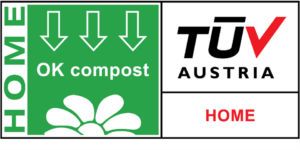Faced with the tsunami of plastic pollution, more and more consumers are paying attention to the environmental quality of their packaging. Many of them are now turning to packaging made of bio-sourced plastic, composed entirely or partly of vegetable raw materials (corn starch, sugar cane bagasse or algae). Today, this represents only 3% of household plastic packaging in France. But is it really a good solution from an environmental point of view? To answer this question, we first need to look at how it is manufactured:
- If large-scale monoculture of plant raw materials is used to manufacture plastic, the environmental balance sheet will not be favorable. In fact, it means using less land for food production, not to mention the risk of land clearing in some countries.
- On the other hand, if it is made from residues (plant waste), the environmental balance of plant-based plastics is positive. For example, plastics made from sugarcane residues. Once the sugar has been extracted from the cane, the remaining fibers can be converted into polyethylene.
Is biosourced plastic biodegradable?
The term "biodegradable" gives rise to many misunderstandings. The term "biodegradable" appears on biosourced PLA bottles. But beware: if you throw a PLA (polylactic acid) bottle into nature, it will remain intact! Same thing if you put it in your compost at home. When we say that PLA is biodegradable," explains Nathalie Gontard, "it's only under industrial conditions, with the right bacteria and the right temperature". This process is still in the experimental stage in France. The other problem with this PLA plant-based plastic is how to collect it: do you need a special bin? Today, if you buy a PLA bottle, it will end up in the normal garbage can...
Recyclability of plant-based plastic packaging
Once again, it all depends on the resin used. With vegetable matter, we can manufacture the same molecule as the petroindustry: PET (used to make most water bottles). Plant-based PET can be recycled in a conventional plant, but not ad infinitum. PLA, on the other hand, is not recyclable. This bottle looks just like its petroleum-based plastic cousin, except that the optical sorting machines at sorting centers don't recognize it. It is ejected from the chain, and ends up in incineration.
Do you have compostable plastics at home?
Yes, these are plastics with the "OK Home compost" label, recognized in Europe and certified by a private Austrian company, TUV.

This label applies to the PHA family, biopolyesters, plastics manufactured using micro-organisms that decompose plant waste. There are also agro-polymers, the small, very thin (and soft to the touch) bags that have replaced traditional plastic bags in the fruit and vegetable aisle. They're made from one-third corn starch and two-thirds petroleum-based materials, yet they're compostable at home.
What is the vegan bottle?
This is another name given to bottles made entirely from plant-based plastic, i.e. guaranteed petroleum-free. So we find the same issues mentioned above. If these bottles are made from plant waste residues, they are more respectful of nature. The problem remains their end-of-life: for the time being, these PLA containers have no specific collection system, nor any industrial process for composting them. And putting PLA in the yellow bin is pointless, as this material cannot be recycled like a conventional bottle.
Ademe's point of view
In 2016, the Agence de l'environnement et de la maîtrise de l'énergie (French Environment and Energy Management Agency) published an opinion stating that it supported the development of certain bio-based polymers, "likely to provide answers to certain environmental and economic challenges (rising prices and scarcity of fossil resources, etc.)", while acknowledging that more studies were needed on "the environmental and societal impacts of these plastics, and on their entire life cycle". Today, some of these experts also recognize that there is a lot of misleading advertising surrounding the notion of "biodegradable", in particular. Ademe is due to issue a new opinion this summer on biosourced plastics and their end-of-life, to give consumers a clearer picture.
Ademe also warns against the increasing use of the prefix "bio" (as in biosourced), which often leads to confusion in the minds of consumers. In fact, "bio" does not mean that the product is organically produced, nor that it is harmless and has no impact on the environment.

